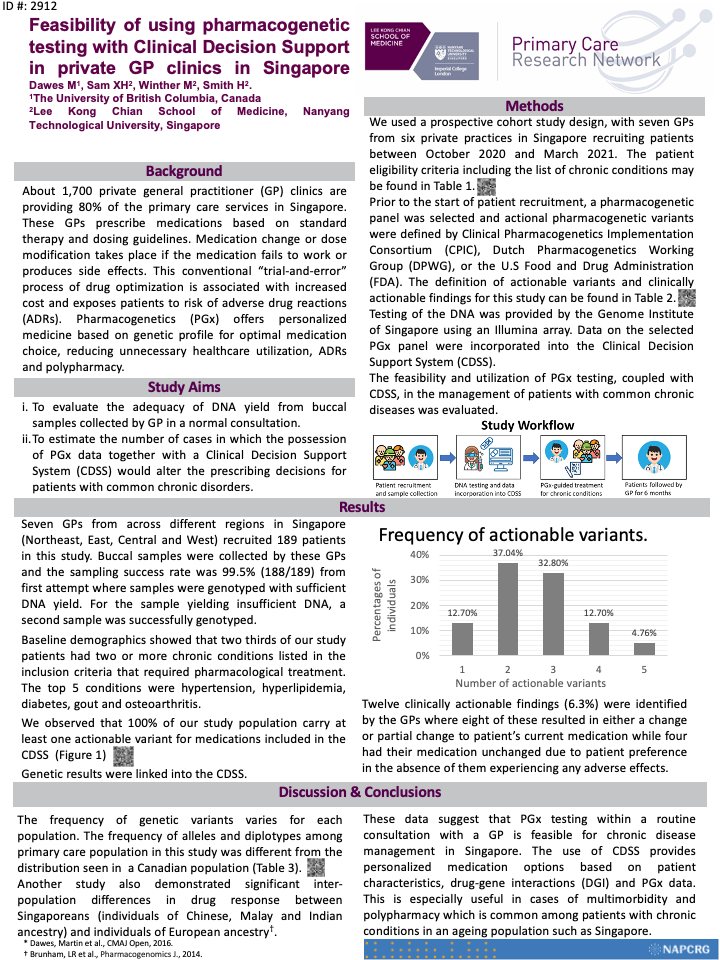PCR029: Feasibility of using pharmacogenetic testing with Clinical Decision Support System in private GP clinics in Singapore
Martin Dawes, MD, PhD, MBBS, FRCGP; Xin Hui Sam, MSc; Helen Smith; Michael Winther, PhD, BSc
Abstract
Primary care provides patients with immediate care at the first line of treatment. There are about 1,700 private general practitioner (GP) clinics providing 80% of the primary care services in Singapore. These GPs prescribe medications based on standard therapy and dosing guidelines. Medication change or dose modification will take place if the patient is unresponsive or experiences side effects. This conventional “trial-and-error” process of drug optimization is associated with increased cost, and subjects patients to risk of adverse drug reactions (ADRs). Pharmacogenetics offers personalized medicine based on genetic profile for optimal medication choice, reducing unnecessary healthcare utilization, ADRs and polypharmacy.
We conducted a feasibility study in private GP practices of the utilization of pharmacogenetic testing and clinical decision support software (CDSS) in the management of patients with ≥1 common chronic diseases. The primary outcomes were adequacy of DNA in the samples collected by GPs and the number of clinically actionable variants among participants. The pharmacogenetic test panel was selected based on accuracy, speed of delivery and cost. Testing of the DNA was provided by the Genome Institute of Singapore using an Illumina array. Data on the selected single nucleotide polymorphisms were incorporated into the CDSS. Seven GPs from six private practices took part in the study.
The buccal samples were taken by GPs within the GP consultation. GPs successfully identified, consented and obtained buccal samples from 189 patients. Of the 189 samples, 188 (99.5%) were successfully genotyped with sufficient DNA yield from first sample collection attempt. For the sample yielding insufficient DNA, a second sample was successfully genotyped. Two thirds of the participants had two or more morbidities requiring pharmacological treatment. Half of all participants had three or more clinically actionable pharmacogenetic variants as defined by Clinical Pharmacogenetics Implementation Consortium, Dutch Pharmacogenetics Working Group, or the U.S Food and Drug Administration. There were significant differences in the distribution of pharmacogenetic variants seen in this population compared with a primary care population from Canada. Follow up is in progress to study the impact of pharmacogenetic reports aided by CDSS on the medication for participants.
These data suggest that pharmacogenetic testing within a routine consultation with a GP is feasible,
We conducted a feasibility study in private GP practices of the utilization of pharmacogenetic testing and clinical decision support software (CDSS) in the management of patients with ≥1 common chronic diseases. The primary outcomes were adequacy of DNA in the samples collected by GPs and the number of clinically actionable variants among participants. The pharmacogenetic test panel was selected based on accuracy, speed of delivery and cost. Testing of the DNA was provided by the Genome Institute of Singapore using an Illumina array. Data on the selected single nucleotide polymorphisms were incorporated into the CDSS. Seven GPs from six private practices took part in the study.
The buccal samples were taken by GPs within the GP consultation. GPs successfully identified, consented and obtained buccal samples from 189 patients. Of the 189 samples, 188 (99.5%) were successfully genotyped with sufficient DNA yield from first sample collection attempt. For the sample yielding insufficient DNA, a second sample was successfully genotyped. Two thirds of the participants had two or more morbidities requiring pharmacological treatment. Half of all participants had three or more clinically actionable pharmacogenetic variants as defined by Clinical Pharmacogenetics Implementation Consortium, Dutch Pharmacogenetics Working Group, or the U.S Food and Drug Administration. There were significant differences in the distribution of pharmacogenetic variants seen in this population compared with a primary care population from Canada. Follow up is in progress to study the impact of pharmacogenetic reports aided by CDSS on the medication for participants.
These data suggest that pharmacogenetic testing within a routine consultation with a GP is feasible,

Jack Westfall
jwestfall@aafp.org 11/20/2021Great to see your work and research Dr Dawes. Great poster and abstract. Thanks